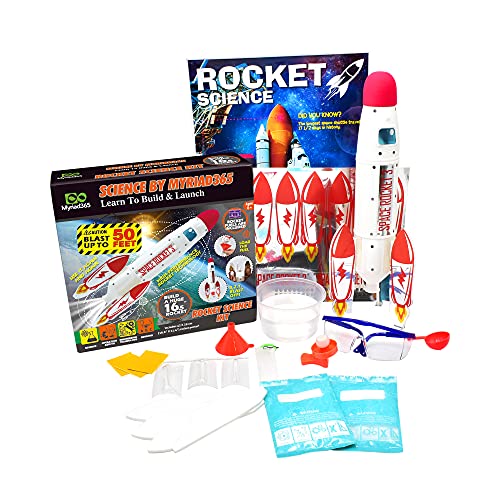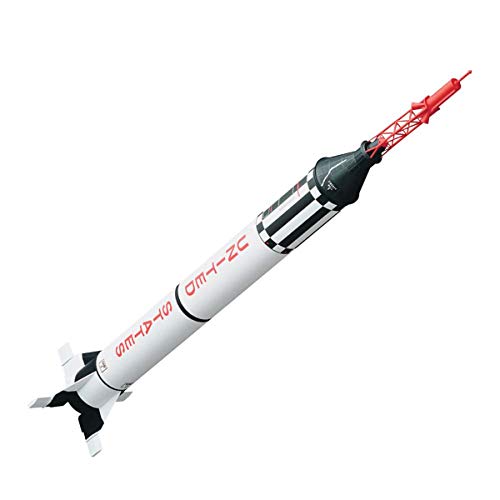| Construction Rating: | starstarstarstarstar_border |
| Flight Rating: | starstarstarstarstar_border |
| Overall Rating: | starstarstarstarstar_border |
| Manufacturer: | Semroc  |
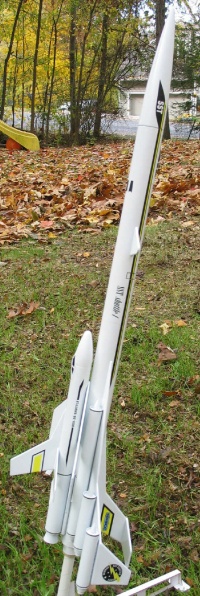
Brief:
A "carbon copy" of a Centuri classic by Semroc. The long booster
loaded with "ramjets" releases a very cool looking glider at ejection
and returns via 2 12" parachutes. Semroc provides all the parts including
beautiful resin ramjet cones, laser cut fins, and decals. Instructions are not
included but may be downloaded off the Internet.
Construction:
The parts in the kit:
- 1 10.5" ST-10 body tube
- 1 8" ST-10 BT
- 4 2.5" ST-5 BTs
- 2 6" ST-5 BTs
- 1 4.9" ST-7 BT
- 2 3" ST-7 BTs (one is the engine tube)
- 1 BC-1050 balsa nose cone
- 1 BC-715 balsa nose cone
- 1 plastic ramjet cone set (6 nose and 6 tail cones)
- 1 HTC-10 coupler
- 1 HTC-7 coupler
- 1 IKCC-1P fiber disc
- 1 TR-7 thrust ring
- 2 3/16" launch lugs, 3" long
- 1 large screw eye
- 1 length of elastic cord (12")
- 1 length of Kevlar® thread (30")
- 2 CR-710 centering rings
- 1 EH-28 engine hook
- 3 sheets of laser cut fins
- 1 decal sheet
- 2 12" parachute packs
- 1 cardstock shroud and canopy sheet
- 1 die cut tape elevator set
- 2 WW-8 (large) washers for nose weight
Also in the beautiful packaging is an exploded view, history of Centuri and the SST Shuttle and 9 construction notes detailing the changes Semroc has made to update the kit.
There are two "sets" of instructions to comment upon: Semroc's and Centuri's. Semroc details the Kevlar® attachment to the motor hook, parachute attachment, addition of nose weight, and use of larger launch lugs. Semroc's notes are crystal clear. They recommend a standard recovery arrangement instead of the horizontal booster recovery in the original instructions. I followed this not wanting to risk breaking off the tail. The other change involves substituting 3/16" lugs for the 1/8" on the original. These are glued along the tube that will serve as the mount for the glider. This is to allow clearance of the glider wings, which would otherwise be in the path of the launch rod. After sizing up the situation, I elected to use 1/8" lugs from my parts stash and install another functional launch lug between the innermost ramjet tube and main BT. I didn't think the larger lugs would allow enough clearance and the smaller lugs look more authentic.
The Centuri instructions are typical for Centuri in the early 70s. They are straightforward but annoyingly short of useful measurements. For example, the booster's wings are aligned by laying down the BT and lining up the ST-5s so the wings can rest on them and be glued to the main BT. Yes it works, but it leaves you to eyeball the attachment of the canards and rudder. I wound up marking lines with a 4-fin guide. Also, the instructions say to mount the rudder 1" from the rear of the BT, but don't say how far up to mount the wings. From the pictures I guessed and glued them 1/2" from the rear. The glider wings dihedral is established by gluing them on and turning the glider on its back. You have to eyeball the rudder and the tail planes are glued to the rudder/BT joint. My 40+ year old eyes need a little more help aligning things these days!
The wings and rudders are built by first gluing two or three pieces together. I did this on wax paper and placed a light book over them to make sure they stayed flat. I sanded the edges round before attaching to the BTs. I also airfoiled the top edges only of the glider's main wings to try to get more lift. I also used Elmer's Fill 'n' Finish on the main wings of the booster before gluing on the ramjet tubes. Be careful if you choose this method, because after I glued on the inner tubes, they pushed the wings upward a little.
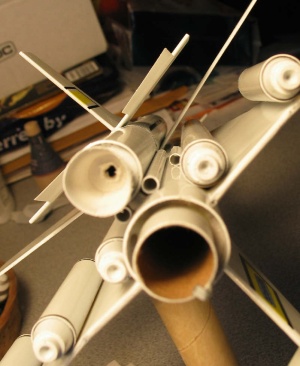 Semroc
reminds you to sand down the HTC-7 coupler so the glider will come off at
ejection. It takes a lot of sanding. There is a noticeable vacuum effect with
the glider as there is a fiber disc on the back of the mounting tube for the
paper nozzle. I wound up carving a hole with a X-Acto knife to prevent a seal.
I would recommend making a hole in the disc with a hole punch before attaching
it to the tube.
Semroc
reminds you to sand down the HTC-7 coupler so the glider will come off at
ejection. It takes a lot of sanding. There is a noticeable vacuum effect with
the glider as there is a fiber disc on the back of the mounting tube for the
paper nozzle. I wound up carving a hole with a X-Acto knife to prevent a seal.
I would recommend making a hole in the disc with a hole punch before attaching
it to the tube.
I used CA to attach the resin ramjet cones and washer weights and yellow wood glue for the rest of the construction. My only issue with the parts is that the two ST-10 tubes appeared to come from different batches. The diameters seem slightly different and I got a bit of a step at the joint. After I filled the spirals and primed and painted though, it's hardly noticeable.
Finishing:
I used thinned Elmer's Fill 'n' Finish on the balsa and BTs to kill the
spirals. I needed a bit more on the main BT joint. I used only one very light
coat on the glider's parts as the instructions indicate. For the main rocket I
used one coat of primer, sanded it down and two coats of Duplicolor automotive
gloss white acrylic spray. I skipped the primer on the glider and used lighter
coats of white. The decals are beautiful. The film is a little thick, but they
stick well. I added 1/16" black pinstripe decals from my spares to the
ramjet tubes to match the Centuri catalog photos because it really needed
something to break up all that white. I gave everything a coat of Future floor
polish to seal the decals, skipping the glider's wings, which don't have any
decals.
Construction Rating: 4 out of 5
Flight:
Semroc follows Centuri in recommending B4-2 and C6-3 engines. I flew it twice
with B4-2s and once with a C5-3. There was a bit of a gusty wind at times and
the first flight weathercocked slightly but still flew nicely to a little less
than 100 feet. Ejection was just past apogee, the glider separated, and both
chutes opened. The booster came down fairly swiftly but landed in grass with no
damage. The glider made several very nice sweeping circles and landed about 100
feet from the pad. Another flight on a B4-2 was about the same with a bit of
chute tangling. The C6-3 flight was arrow straight to almost 500 feet in about
a 10 mph wind. The glider came in a little steep on this last flight, perhaps
because I didn't flex the elevators enough. The SST Shuttle is a beautiful
sight off the pad and a lot of fun to watch at ejection. I actually prefer the
B on this because ejection is nice and low and you don't risk losing the
glider.
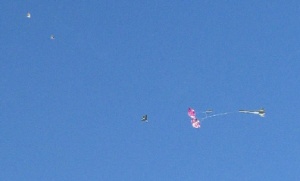
Recovery:
Semroc includes a length of Kevlar®
to attach to the forward end of the engine hook and then to an elastic shroud
line for a standard recovery arrangement. In the original, a harness is made
with a piece of shroud line going back to the engine hook on the outside of the
main BT. This would allow the booster to return horizontally, but as the Semroc
instructions point out, there is a risk in snapping off the rudder with this
arrangement. The original also featured one 20" parachute. Semroc supplies
two 12" parachutes and suggests one may be enough for "soft"
fields. I used both chutes in the standard arrangement with the elastic shock
cord, the two chutes at the top of this, and the end of the shock cord attached
to the screw eye in the nose cone.
The glider must be hand launched to check for trim and the elevator tabs adjusted. This was fairly easy to do and I set one elevator slightly higher to get a circle.
Although there was no damage, the last two flights had some parachute tangling. I prefer single chutes when possible and will probably replace the two with a 20" parachute if Semroc comes out with them. The booster did come down pretty quickly and one 18" chute may not be enough; it's pretty hefty with the nose weight and ramjet parts.
Flight Rating: 4 out of 5
Summary:
Thank you, Semroc for bringing this one back! My only ideas for improvement
would be a better match for the ST-10 BTs, inclusion of BT marking guides, and
an ST-7 fiber disc with a pre-cut hole to ease glider ejection. I would also
prefer one 20" parachute. I couldn't imagine the booster coming back
safely on just one 12" chute and using two means there are risks of them
tangling. I would also say to go with the original size launch lugs and include
a third for mounting away from the glider wings. Otherwise, typically excellent
Semroc components and packaging. This is a gorgeous rocket when completed and
will turn heads at the field.
Overall Rating: 4 out of 5
Other Reviews
- Semroc SST Shuttle-1 (xKit) By Chan Stevens (November 8, 2008)
Brief: This is Semroc's retro-repro of the 1971 Centuri KC-17 Shuttle. The Centuri kit was itself a bit of a copy of the Estes Orbital Transport. The shuttle is a parasite glider that separates at ejection, while the main body descends under chute. Construction: This is an xKit, meaning it's basically a bag of parts without instructions though the instructions are archived ...
 |
 |
Flights
Sponsored Ads
 |
 |

